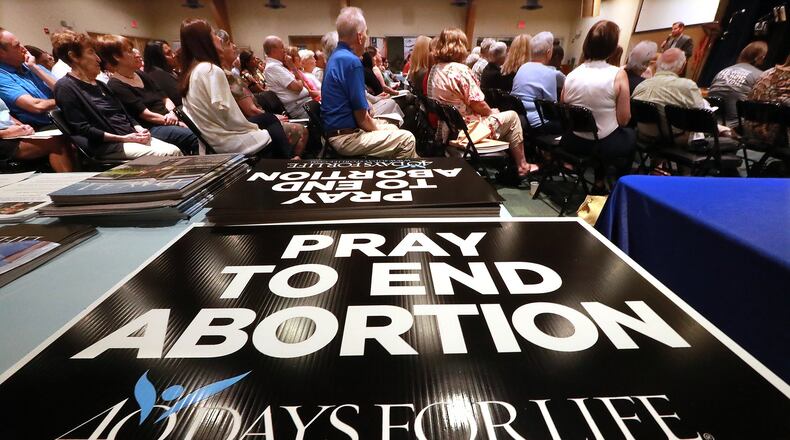Georgia's fight over anti-abortion legislation garnered national attention earlier this year when many in the movie industry threatened to boycott filming in the state if the courts allowed the law to go into effect.
That threat was put on hold after a federal judge last month temporarily blocked the measure — which would have banned most abortions once a doctor could detect fetal cardiac activity — from taking effect while a challenge to the new restriction makes its way through the legal system.
With the talk of a film boycott now on hold, the legislation could move to a soundstage at Tyler Perry Studios in southwest Atlanta as a topic of discussion at Wednesday’s Democratic presidential debate.
Georgia is one of several states that passed legislation this year limiting access to abortion as activists hope such laws will cause the U.S. Supreme Court to revisit the landmark Roe v. Wade decision that guaranteed a woman’s right to the procedure. Federal judges have temporarily blocked laws from taking effect in each state.
Related: 10 things to know about the debate
Related: The major issues in Georgia
Related: Where to find the White House hopefuls in Georgia this week
The law Georgia’s General Assembly passed earlier this year, House Bill 481, would have banned most abortions once cardiac activity could be detected in the womb, which can occur about six weeks into a pregnancy and before many women even know they are pregnant.
The American Civil Liberties Union of Georgia sued the state, saying the law violates a woman’s right to access abortion until about 24 weeks of pregnancy, as established by the U.S. Supreme Court in 1973.
The judge’s decision to temporarily block Georgia’s new anti-abortion law from taking effect as scheduled in January sets up a legal battle that could play out while the Legislature is in session. The next filing deadline in the court case is Jan. 18, less than a week after state lawmakers return to Atlanta for the 2020 legislative session.
That not only sets up what Democrats believe will be a visible fight over abortion access, but could also lead to Republicans exploring alternative ways to limit the medical procedure through new legislation.
While several Republican-led states passed anti-abortion legislation this year — including Alabama, Kentucky and Mississippi — Georgia's law includes what many supporters call "personhood" language that would extend legal rights to fertilized eggs.
AJC Poll: Georgia voters on the candidates and issues
Related: Voting struggles put spotlight on major elections in Georgia
Supporters said they think that difference will make Georgia’s law the one to overturn Roe v. Wade.
Georgia’s law would allow parents, once fetal cardiac activity is detected, to claim an embryo on their taxes as a dependent, and it would be counted toward the state’s population. A court could also order a father to pay child support after fetal cardiac activity is detected.
If the law goes into effect, later abortions would be allowed in cases of rape, incest, if the life of the woman is in danger or in instances of “medical futility,” when a fetus would not be able to survive after birth. To obtain an abortion after six weeks of pregnancy because of rape or incest, a woman would have to file a police report.
The proposal moved quickly through the Legislature despite the reported number of abortions performed in Georgia trending downward over the past 25 years.
However, there was a spike of nearly 1,100 — or almost 4% — in 2018. According to U.S. census figures, Georgia added about 100,000 residents between 2017 and 2018.
The abortion count has dropped by nearly 15% since 1994, due mostly to increased access to various forms of birth control, experts say. Georgia had a population of about 7 million in 1994, according to census figures. By 2018, that had risen to 10.5 million.
About the Author
Keep Reading
The Latest
Featured




